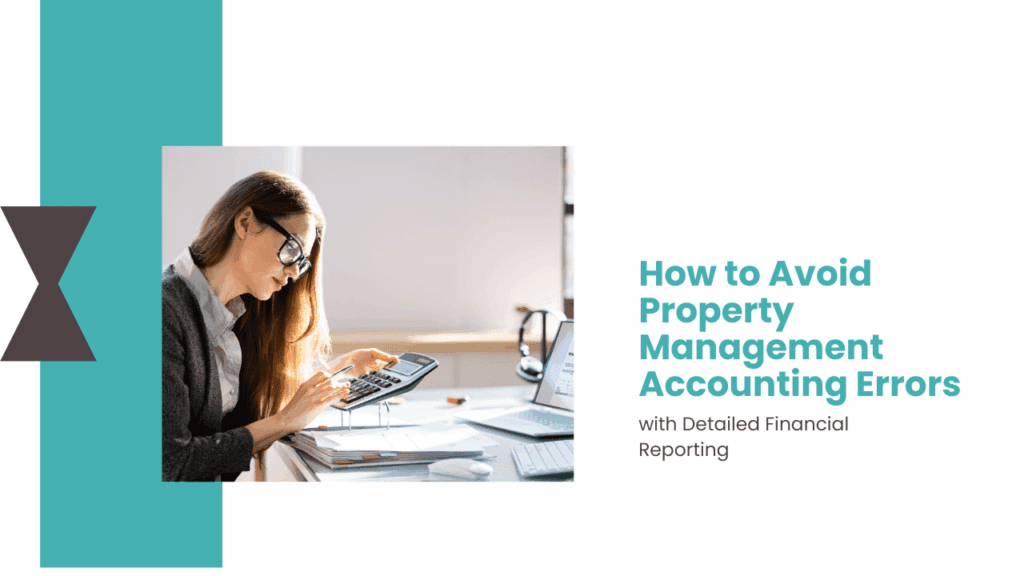
Nothing will derail your momentum and success as a real estate investor like a financial error.
Instead of managing those mistakes and recovering from the problems they cause, let’s avoid them altogether.
As professional property managers, we know that detailed financial reporting can make a big difference in avoiding errors and enjoying a more consistent, balanced, and profitable investment experience. We want to explore how detailed financial reporting can help you avoid property management accounting errors, protect your portfolio, and give you a clearer picture of your business performance.
Why Accounting Errors Are So Common in Real Estate Investment
There are a lot of financial moving parts when it comes to renting out properties. Mistakes are easy to make. If you’re not tracking your income and expenses carefully, those mistakes get even easier on landlords and property owners.
We have seen even the most well-intentioned property owners and investors fall into accounting pitfalls. The complexity of property management, which ranges from tracking multiple revenue streams to handling repair expenses, security deposits, and mortgage payments, will always make the accounting landscape treacherous.
In our experience, some of the most common errors are due to things like:
- Manual data entry mistakes
- Mixing personal and business expenses
- Improper handling of security deposits
- Failure to reconcile bank statements
- Lack of standardized reporting procedures
If you have ever found yourself climbing out of one of these black holes of accounting, you know that when left unchecked, these issues can lead to incorrect tax filings, missed deductions, and even legal trouble.
Our Recommended Solution: Detailed Financial Reporting
The antidote to accounting errors is detailed, accurate, and consistent financial reporting. When you systematize your reporting, you reduce the room for human error and create a trail of accountability.
But what exactly does that entail?
Let’s break it down.
- Standardize Your Chart of Accounts
Your chart of accounts (COA) is the foundation of any smart financial reporting structure. This is where you have all transactions pertaining to your investment properties categorized into predefined buckets, such as rental income, utilities, maintenance, and mortgage interest.
How can this help you avoid those common errors we talked about? You’ll find it prevents the misclassification of expenses. It also makes monthly and annual reporting consistent, and it simplifies your annual tax preparation.
Customize your COA to align with how you operate your properties. For example, break out “repairs” into plumbing, HVAC, and general maintenance if you want deeper insights. There’s a lot you can do with this, and we’d be happy to assist with the set-up.
- Invest in Property Management Accounting Software
Manual accounting systems, like spreadsheets, are prone to human error. Invest in a property management software with built-in accounting tools. Some popular options for independent investors and landlords include:
- Buildium
- AppFolio
- Rentec Direct
- Propertyware
There are numerous benefits to technology and accounting software. For starters, you’ll find it automates every transaction entry. It also offers detailed, property-specific financial reports and helps you to manage multiple bank accounts. We know that owners have found that the right software allows for easy bank reconciliation. These platforms also integrate with online rent collection and expense tracking tools, which further reduce the risk of errors.
If you recognize the value of software and technology but you’re not willing to invest in it yourself, consider partnering with a property management team. We already have this technology in place, and when you work with us, you can leverage all we have to offer.
- Reconcile Bank Accounts Monthly
Bank reconciliation ensures that your financial records match your actual bank statements. This is one of the most overlooked safeguards in property management accounting. It’s something that you’ll want to do consistently, especially if you’re interested in avoiding time-consuming errors that are both frustrating and expensive. If you’ve never done it before, you’ll find that it’s not terribly challenging. Simply compare each transaction in your accounting software with your bank statement. Investigate discrepancies like missing deposits or unauthorized withdrawals, and correct errors immediately. Doing this monthly helps you spot problems early, before they snowball into major issues.
- Track Income and Expenses by Property
If you manage multiple properties, it’s vital to track income and expenses at the property level. Blending all your financials into one pot can make it hard to assess performance or detect anomalies. You’ll want an overview of your entire portfolio, of course, but having unique statements and reports for each property can help you evaluate ROI by property. It also makes your tax filing easier, especially with Schedule E for each property. Most importantly, it enables better budgeting and forecasting.
Detailed reporting per property gives you the insight to make smarter decisions, such as whether to renovate, sell, or refinance. Make sure you’re able to separate out the performance of each property, however you’re planning to manage your financial reports.
- Separate Security Deposits from Operating Funds
One common accounting misstep is failing to treat security deposits correctly. In most jurisdictions, security deposits are considered liabilities, not income. Florida has some requirements around security deposits, requiring you to keep them in a Florida financial institution. Additional best practices include:
- Use a separate escrow account for holding deposits
- Track them as liabilities on your balance sheet
- Only recognize them as income if they’re forfeited legally
Improper handling can not only lead to accounting errors but also legal penalties if you don’t comply with local laws. Be careful with your security deposits. Make sure they’re well-documented and that you’re transparent about where you’re holding them.
- Maintain a Consistent Reporting Schedule
As property managers, we’re providing real-time financial reports to our owners through their online portals. This is important because regular reporting keeps you in control and ensures you’re always working with up-to-date information. Establish a monthly financial review process that includes profit and loss (P&L) statements, a cash flow statement, your balance sheet, and a budget vs. actual analysis. Quarterly reviews should take a deeper dive and include tax estimates, capital expenditures, and strategic goals.
Leverage Professional Property Management Services
Those are some of the best tips we can provide property owners when they’re trying to set themselves up in a way that avoids unnecessary errors. Your secret weapon, however, is likely something you are either already using or needlessly overlooking.
We’re talking about professional property management. As any successful investor will tell you, there’s immense value in having a management company track and report your finances. There’s accountability and less risk. We will not only provide reports, but also review them for accuracy. We’ll prepare your tax documents and advise you on complex transactions such as 1031 exchanges and depreciation schedules. We work with accountants who are familiar with real estate and can spot issues that generic financial professionals might miss.
Monitor Key Performance Indicators (KPIs)
Another good way to keep yourself from making easy mistakes is to follow your KPIs. Detailed financial reporting isn’t just about avoiding errors. It’s about optimizing performance. By tracking KPIs, you can proactively manage your rental business. Here are some examples of useful KPIs:
- Net Operating Income (NOI)
- Operating Expense Ratio
- Cash-on-Cash Return
- Rent Collection Rate
- Vacancy Rate
When your reports are detailed and reliable, KPI tracking becomes a natural part of your decision-making process.
Implement Internal Controls
When you’re working with multiple professionals, you’ll want to implement internal controls that can provide a checks and balances situation. This will help you to prevent fraud or mismanagement. Internal controls might include:
- Approval requirements for large expenses
- Segregation of duties (e.g., one person handles income, another reviews expenses)
- Periodic audits of financial reports and bank accounts
These practices aren’t just for big corporations. Even a small investor with a few units benefits from strong internal controls.
Everyone involved in the financial tasks associated with your properties must understand how to categorize expenses, collect rent, and track deposits. You want to make sure you understand the accounting software being used and that you know what you’re looking at when you receive those helpful financial reports.
Red Flags That Signal Accounting Errors
A good plan for financial reporting won’t solve every problem or completely shield you from mistakes. Be on the lookout for warning signs that your financial records might be off track:
- Profit/loss statements don’t match your bank balance
- Unexplained variances in income or expenses
- Late payments or missed rent collections
- Security deposit balances seem too high or low
- Inconsistent reporting formats month to month
If you notice any of these, it’s time to take a closer look at your financial reporting systems.
 Avoiding accounting errors in the management of your real estate investments can build a rental business that’s profitable, scalable, and resilient. Detailed financial reporting creates transparency, enhances control, and empowers you to make informed decisions. With the right tools, processes, and professionals in place, you can minimize risk and maximize returns.
Avoiding accounting errors in the management of your real estate investments can build a rental business that’s profitable, scalable, and resilient. Detailed financial reporting creates transparency, enhances control, and empowers you to make informed decisions. With the right tools, processes, and professionals in place, you can minimize risk and maximize returns.
Let’s take a look at where you are and what’s possible. Contact us at Anchor Down Real Estate & Rentals.
